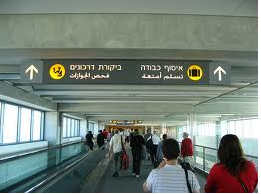The Max Pam Globe
- Sinds 1998
- 24-04-2024
- @maxpam1 volgen © Max Pam
Steniging, terroristen en psychologie
HUMAN
Door de extreme weersomstandigheden kwamen enkele gasten niet opdagen en moesten een aangepast programma geïmproviseerd worden. Vooral met het onderwerp – tien psychologische studies uit 2010 hebben wij ons vermaakt. Hieronder volgt wat ik toch nog op religieus gebied voor u in petto had.
Toto, We’re Not in Cannes Anymore
Bekend is de anekdote over het toneelstuk van Anne Franks Achterhuis. Anne houdt zich verborgen, terwijl de Duitsers een inval doen. Terwijl zij een het huis doorzoeken, roept iemand uit de zaal: “Ze zit daarachter!”
Dat niet iedereen dezelfde beleving heeft bij het zien van een tragedie ondervond de journaliste Ruth Franklin. Ze zag in Cannes de film Badis, die gaat over de steniging van een moslimvrouw. Velen werd het teveel en zij wisten niet hoe zij het einde van de film moesten halen.

Later zag Ruth Franklin van de The New Republic de film terug op het filmfestival van Marrekech. Hier werd Badis heel anders beleefd. Men kwam echt voor het einde.
Er werd zelfs gejuicht toen aan de steniging werd begonnen. Dit is het verslag van Franklin.
Last week, I attended the Marrakech Film Festival. I had never been to a film festival before, but the experience was in some ways no different from what I had imagined about Cannes or Sundance, albeit with a somewhat lower glamour quotient. The opening gala, complete with red carpet and paparazzi, was staged in a swanky convention hall surrounded by five-star hotels.
The requisite stars made appearances: Jury chairman John Malkovich spoke acceptable French to his TV interviewer, while Keanu Reeves, displaying some alarming facial hair, didn’t bother to try. Some of the stars may have toned down their usual style of dress in deference to their Arab hosts (the festival was sponsored by Morocco’s king, Mohammed VI, whose patronage was gratefully and frequently invoked): Marion Cotillard partially obscured her décolletage with feathers, and Susan Sarandon went so far as to wear long sleeves. But Eva Mendes strutted for the photographers on opening night in a backless lavender gown, and later appeared in an above-the-knee strapless concoction.
The festival had an international (if largely French) orientation, but one of its goals was clearly to highlight the indigenous Moroccan film-making community. Among the actors and directors being celebrated was the Moroccan film-maker Mohamed Abderrahman Tazi, whose work I wasn’t familiar with. While other festival guests, together with the stars on the jury, were watching competition films in a vast auditorium, I attended a screening of Tazi’s 1989 film Badis in a smaller hall downstairs, sparsely filled with a mainly Arab audience. This remarkable film takes place in the year 1974 in the fishing village of its title, located on Morocco’s northern coast. The village has only one distinction: It was part of Morocco’s Spanish colony, and the Spanish army maintained a small base there, evidenced mainly by the presence of a single soldier tasked with crossing the village each morning to draw water from its well.
When the film begins, a schoolteacher and his wife have just arrived in the town from Casablanca. Their big-city sophistication immediately contrasts with the villagers: Both are dressed in Western-style clothing, and the wife has an aura of particular cultivation. The teacher, we soon learn, suspects his wife of infidelity and has brought her to this remote location as punishment. (Whether she was actually unfaithful or not is never clarified.) Here she won’t be able to deceive him, he tells her, because the entire village will be keeping an eye on her. No tenderness is evident between these two: He speaks to her gruffly and forbids her even to go out for lunch in the local café, while she sulks in response to his orders.
Solace for the teacher’s wife comes in the form of a local girl named Moira, whose father, a fisherman, rules her with a similarly draconian hand. The two have lived alone ever since Moira’s mother, who was Spanish, escaped back to her native country, an act for which the father continues to punish their daughter. Moira, who dresses up in her mother’s old gowns and sings Spanish songs to herself to escape the drudgery of life as her father’s housemaid, soon begins a flirtation with the Spanish soldier at the well. Meanwhile, she catches the eye of the schoolteacher, who suggests that his wife teach her how to read and write as a stratagem for getting her under his roof. It soon becomes clear that the two women are more interested in pouring out their miserable hearts to each other than in studying the Koran. Together, they come up with a plan to escape the village, which they finally become desperate enough to put into action.
When the men awaken to discover the women missing, the entire village is mobilized to hunt them down. Their escape route, which runs along the beach, is entirely exposed, and they are brought back in a fishing boat. Watching the men of the village gather around the two women in a circle on the beach, I ought to have realized what was about to happen, but somehow it did not process. Not until the first stone was raised did I understand. The stoning of the women was staged tastefully, without excessive gore, but it was among the most shocking things I have ever seen on a movie screen. As the scene ended and I sat back in my seat, shaken, something even more astonishing occurred. From the audience around me there came a smattering of applause.
Until that moment, really, I had forgotten where I was. Seduced by the glitz of the film festival, by the charm and warmth of the Moroccans I had met, by my vision of Morocco as one of the most free and open countries in the Arab world, I had forgotten that there is also a different reality here. Engrossed in a beautiful, sensitively made film about the sufferings of two women under the constraints imposed by male society—a kind of Moroccan Madame Bovary—I had somehow failed to realize that the rest of the audience might not interpret the movie with the same sympathy for the women involved as I did. And which reading did the director intend? Signals throughout—the loving and gentle portrayal of the two women, their luscious beauty and their tender treatment of each other, in contrast to the unkindness and brutality of the men—suggested that Tazi, an accomplished director, meant his film to be sympathetic to the women and critical of the strictures of Islamic law. (Another of his films, which I saw a few days later and which dealt with polygamy in a way that was both humorous and gently deprecatory to the husband, reinforced this impression.) But a companion suggested that parts of the film might have been deliberately ambiguous—not necessarily because Tazi himself believes that wayward women ought to be stoned, but in concession to a public for whom that does not constitute an atrocity, or a revelation.
Lees het hele verhaal hier.
Toch zielig.
“Bent u een terrorist?”
Op het Ben Gurion vliegveld (zie foto) in Tel Aviv voert men een heel ander strategie bij het ontdekken van terrorisme dan in de rest van de wereld. Geen scans en andere technologie wordt er gebruikt, er vinden geen fouilleringen plaats, maar de passagiers worden aangesproken door getraind luchthavenpersoneel, dat vloeiend zijn talen spreekt.

Men stelt allerlei vragen en het resultaat is verbluffend. De terroristen verraden zichzelf. Zelfs bij een standaardvraag als: ‘Are you a terrorist?’.
“….Eh….ja. Ik bedoel…eh…nee.”
De Mail had er een zeer uitgebreid stuk over:
The security checks at Ben Gurion, Israel’s main international airport near Tel Aviv, are . intense. But they are surprisingly discreet. There are no groups of armed police patrolling through the concourses (though if necessary, of course, they will appear very rapidly).
The new intrusive body scanners that reveal naked bodies beneath clothing – recently introduced in America amid passenger resentment – are not in use. Instead, Ben Gurion’s critical line of defence consists of polite, highly trained agents, most of them women. Fluent in several languages, they will speak to every passenger while they wait to drop their luggage or check in.
‘We operate on the principle that it’s much more effective to detect the would-be terrorist than try to find his bomb,’ says a senior Israeli official. ‘The 9/11 hijackers killed 3,000 people without real weapons or explosives. To be safe, you have to be able to stop the person who has hostile intentions. That’s how our system works.’
The Israelis call this method ‘behaviour pattern analysis’, and it starts beyond the airport: the passenger who pays cash for a one-way ticket at an airline offi ce will be more likely to attract attention than someone who uses a credit card to purchase a return over the internet.
Its first physical layer lies more than a mile from the terminal: a checkpoint for every vehicle on the only airport access road. I’ve passed through Ben Gurion many times, and once I was stopped and had my baggage searched there – apparently because I wasn’t in a taxi, but in a somewhat ancient private car being driven by an Arab friend.

Lees het hele verhaal hier verder.
De 10 meest opvallende resultaten van psychologische studies in 2010
Maar de meeste tijd brachten wij vreugdevol door met een bericht op Welingelichte Kringen, die het weer had van Psychology Today.
De top tien ziet er zo uit:
1. Onze gedachten dwalen ongeveer de helft van de tijd af
2. Tijdens onderhandelingen zit je beter op een harde stoel
3. Angstzweet doet je risico’s nemen
4. Indruk willen maken beïnvloedt je waarneming
5. Wij zijn gelukkiger als we bezig zijn, maar we zijn te lui
6. De rijken zijn echt anders
7. Religies maken mensen gelukkiger
8. Knappe mensen worden beter begrepen
9. Een krachtige houding geeft je een biochemische boost
10. Wie alles uitstelt, moet een pauze inlassen
Vooral nummer 5 sprak Theodor bijzonder aan: De deelnemers aan een onderzoek kregen een beloning om een volledig ingevulde vragenlijst naar een plek te brengen waarvoor ze 15 minuten moesten lopen, maar ze konden de lijst ook meteen inleveren en 15 minuten wachten. De meerderheid (68%) koos voor onmiddellijk inleveren en wachten, maar achteraf voelden de mensen die gingen lopen zich gelukkiger dan de ‘luilakken’.
Inderdaad, liever lui dan moe, maar minder gelukkig.
Lees hier voor een nadere omschrijving van de tien onderzoeken.